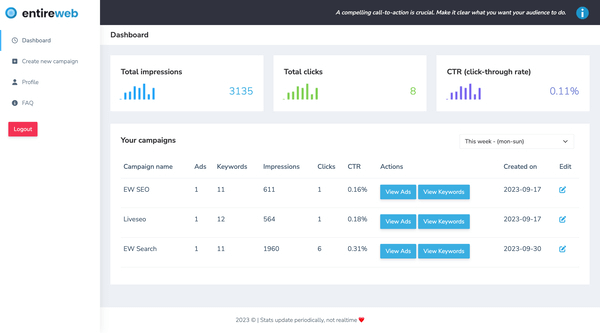1. Early days
The first search engine was Archie, created in 1990 by Alan Emtage, a student at McGill University in Montreal. Archie indexed the filenames of files stored on anonymous FTP (File Transfer Protocol) servers, allowing users to find specific files stored on these servers. This was a useful tool for researchers and academics who needed to access specific documents on these servers. This milestone marks a crucial chapter in the history of search engines.
In 1993, the first search engine for the World Wide Web, called World Wide Web Wanderer, was created by Matthew Gray. This search engine used a spider, or automated software, to crawl and index pages on the web. The spider would follow links from one page to another, indexing the content of each page as it went. This allowed users to search for specific words or phrases on the web, rather than just specific files on FTP servers.
In 1994, the first search engine with a graphical user interface (GUI) was created by David Filo and Jerry Yang, two students at Stanford University. This search engine, called Yahoo!, was a directory-based search engine that organized web pages into categories. Users could browse through these categories to find web pages related to a specific topic. Yahoo! also had a search function that allowed users to search for specific words or phrases, but the results were limited to pages that had been manually added to the Yahoo! directory.
In 1996, a new search engine called AltaVista was launched. AltaVista used a more sophisticated algorithm to index and rank pages, making it the first search engine to use the concept of PageRank, which was invented by Google co-founder Larry Page. PageRank analyzed the link structure of the web, taking into account the number and quality of links pointing to a particular page, to determine the importance of that page. This allowed AltaVista to deliver more relevant search results to users.
2. Here comes Google
In 1998, Google was launched by Larry Page and Sergey Brin while they were students at Stanford University. Google used PageRank and a complex algorithm to deliver relevant and accurate search results to users. Google also introduced the concept of "advertising with relevance," where advertisers could bid on specific keywords and have their ads appear alongside search results related to those keywords. This became known as pay-per-click advertising, and it allowed Google to generate revenue while providing a valuable service to users.
Google quickly became the most popular search engine, and it remains so to this day. Since its launch, Google has continued to innovate and improve its search algorithms and services. It has also expanded into other areas, such as email, maps, and cloud storage.
3. Alternative Search Engines
There have been many other search engines developed over the years, such as Bing, DuckDuckGo, and Ecosia. However, Google has remained the dominant search engine due to its continued focus on delivering relevant and accurate search results to users and its ability to monetize its services through advertising.
4. The future and beyond
In recent years, there has been a shift towards voice-activated search, with the rise of virtual assistants such as Amazon's Alexa and Google Assistant. These assistants allow users to search for information or perform tasks using natural language voice commands, making search even more convenient and accessible.
Search Engine History Timeline
-
Archie
Start: Created in 1990 by Alan Emtage
End: Archie's active development waned in the mid-1990s -
Veronica
Start: Created around 1992
End: Lost relevance as more sophisticated search engines emerged -
Jughead
Start: Created around 1993
End: Became less relevant as the web evolved -
World Wide Web Wanderer
Start: Created in 1993 by Matthew Gray
End: Became less prominent as more advanced search engines emerged -
WebCrawler
Start: Launched in 1994 by Brian Pinkerton
End: Continues to exist but has evolved over time -
Lycos
Start: Launched in 1994 by Michael Loren Mauldin
End: Lycos remains operational as a web portal -
Yahoo! Directory-based Search Engine
Start: Created in 1994 by David Filo and Jerry Yang
End: Transitioned to a web portal and diversified services -
Altavista
Start: Launched in 1995
End: Acquired by Yahoo! in 2003, shut down in 2013 -
Excite
Start: Launched in 1995
End: Remains operational with a focus on news and email services -
MetaCrawler
Start: Launched in 1995 by University of Washington students
End: Remains operational as a metasearch engine -
HotBot
Start: Launched in 1996 by Wired Magazine
End: Acquired by Lycos and later refocused as a metasearch engine -
Ask Jeeves (Ask.com)
Start: Launched in 1996 by Garrett Gruener and David Warthen
End: Rebranded to Ask.com in 2006, remains operational -
Dogpile
Start: Launched in 1996 by Aaron Flin
End: Dogpile remains operational as of the present day -
Yandex
Start: Launched in 1997 by Arkady Volozh, Ilya Segalovich, and Arkady Borkovsky
End: Remains operational as of the present day
-
Google
Start: Launched in 1998 by Larry Page and Sergey Brin
End: Remains active and dominant as of the present day -
Alltheweb
Start: Launched in 1999 by FAST Search & Transfer
End: Acquired by Yahoo! in 2003, technology integrated -
Entireweb
Start: Launched in 2000
End: Entireweb remains active as of the present day -
Gigablast
Start: Launched in 2000 by Matt Wells
End: Gigablast remains operational as of the present day -
Mojeek
Start: Launched in 2004 by Marc Smith
End: Remains operational and emphasizes unbiased search results -
Exalead
Start: Launched in 2006 by François Bourdoncle
End: Acquired by Dassault Systèmes and continues to offer enterprise search solutions -
Bing
Start: Launched in 2009 by Microsoft
End: Remains active as of the present day -
DuckDuckGo
Start: Launched in 2008 by Gabriel Weinberg
End: Remains active and popular for privacy-focused searches -
Startpage
Start: Launched in 2009 by Ixquick
End: Continues to operate, emphasizing private search and Google results -
Ecosia
Start: Launched in 2009 by Christian Kroll
End: Remains active and focused on environmental sustainability -
Qwant
Start: Launched in 2013 by Éric Léandri
End: Remains operational with a focus on user privacy -
Swisscows
Start: Launched in 2014 by Andreas Wiebe
End: Remains operational, known for user privacy and semantic search -
Brave
Start: Launched in 2016 by Brendan Eich and Brian Bondy
End: Remains active and known for privacy-focused browsing
Published January 9, 2023


